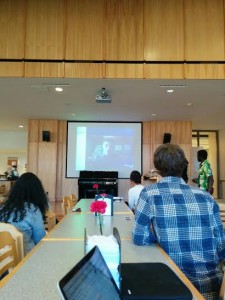Well, it looks like spending an evening with GRF Laura Rodriguez de Simons ended up being my final Rose Scholar event of the semester. Unfortunately, I was not able to stay for the whole talk due to a seminar I had to attend. Nevertheless, I was able to get a good grasp of what Laura wanted to communicate in the time frame that she had. I have stated in the past that I take a lot of things for granted. I always try to reflect on how truly blessed I am to be at Cornell. One of the things that I usually overlook is that one thing we can all use every once in a while: help. As Cornell students, we are constantly bombarded with flyers, emails, and messages that relay available resources for those who are struggling in their personal lives.
As someone who is interested in pursuing a career in clinical psychology, I admire Laura for her dedication to serving others via The Advocacy Center of Tompkins County. She also has a global perspective on social work, as she has lived and worked in Ethiopia and Central America. How does one turn their passion into a career? Well, I personally must first know what my passion is. Although I love psychology, can I truly call it my passion? Recently, I have had a special desire for working in the entertainment industry. Perhaps, it is time to actually look into it and not just dream about it. Social work is not the only way one can serve others. Stop thinking about your passion: just do it 😉


